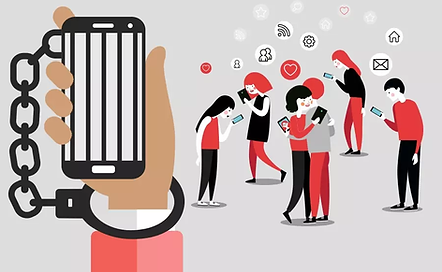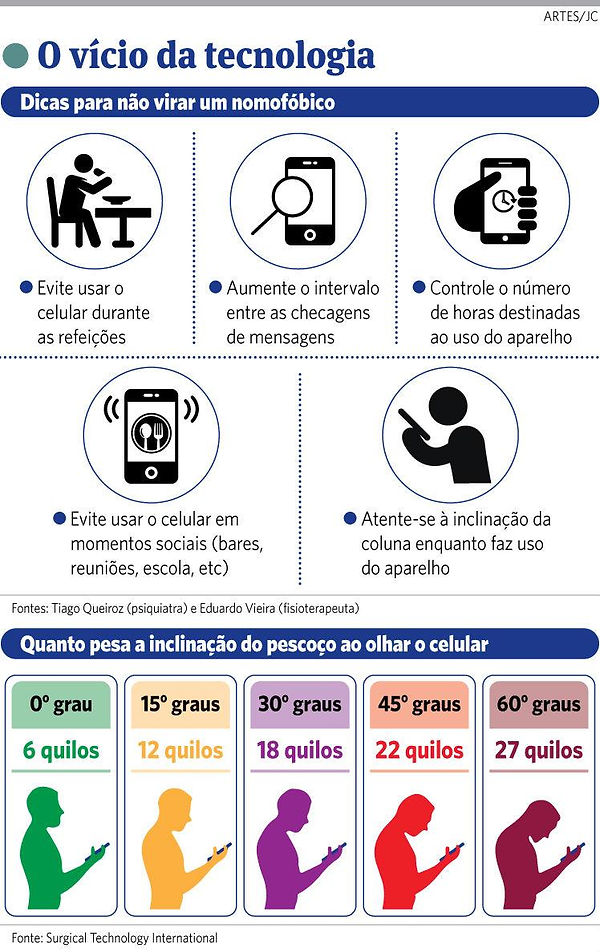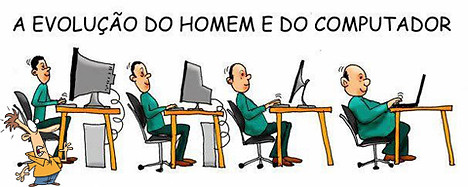
nomophobia
Digital


THE NEW DISEASE OF THE CENTURY INSIDE YOUR HOME
DIGITAL NOMOPHOBIA, DISEASE CAUSED BY THE POCESSIVE AND INADEQUATE USE OF TECHNOLOGY IN EVERYTHING INVOLVING DIGITAL SYSTEMS.
GAMES, SITES, FACEBOOK, TIK TOK, INSTAGRAM ETC...
SYMPTOMS 👉 FEAR, ANXIETY, STRES, CHEST PAIN, HEART RATE ACCELERATION, OBESITY, DEPRESSION, PUPIL DILATATION, INCREASED MEOPIA, NAUSEA, DIFFICULTY IN BREATHING, PANIC ATTACK ETC...
Follow the articles below.
Technological learning and distractions:
The damages in attention, concentration and memory resulting from the excessive use of digital technologies are evident.

Music - Disconnect - Daniel Salles
New technologies, as well as new challenges and forms of communication, have also brought us new dependencies (in this case, cell phone addiction) or irrational fears (losing it or going out without it) – Nomophobia.
What is nomophobia?
Nomophobia is a relatively new disease that can be defined as the fear of being without a cell phone, even panic, characterizing a phobia of being without a cell phone.
And it's not a disorder to ignore, because it can have health consequences. Among the most common symptoms, anxiety and stress from losing your phone or not having internet/WiFi coverage to stay connected.
Let's take a closer look at what nomophobia is and what to do to detect the first symptoms of excessive dependence on the cell phone.
Symptoms of Nomophobia
Fear, anxiety, stress and panic attacks at the thought of going out without a cell phone. Symptoms can lead to other side effects such as tremors, sweating, dizziness, difficulty breathing, nausea, chest pain, rapid heart rate. These are symptoms of addiction.
Causes of cell phone addiction
This psychopathological addiction goes beyond a simple phobia, so natural remedies such as anti-anxiety may not be effective. Low self-esteem and difficulties in social relationships are risk factors that can cause nomophobia.
Addiction to social media reward systems – such as facebook likes, retweets, youtube video views, and Instagram 'hearts' – can also be a contributing factor in addiction, as it is a way to get little psychological pleasures. easily and quickly.
Treatment for nomophobia / how to lose cell phone addiction
If you react badly when you lose your mobile coverage or you simply don't have wifi, and you can identify any of the above symptoms, you should consult a specialist to make an accurate diagnosis and think of the timely action to cure pathological dependence on mobile. The most important thing is to identify the problem.
Alone, it is possible to try to 'disconnect' little by little, finding interests other than the internet, and trying to prioritize offline activities and face-to-face social encounters. Also, start to consider that it is not necessary to take a picture of every moment of your life to put it on instagram, facebook, snapchat, etc.
Source: https://ospyciu.wordpress.com/2018/01/30/sobre-nomofobia-textos-charges-e-videos/
TIPS FOR NOT FALLING INTO TECHNOLOGY ADDICTION
.jpg)


Are we evolving or regressing?
How is our knowledge about rules, tips and laws on the internet.
WEBSITE TIPS:

The matter is so serious that laws have been created to regulate its use.
“The Internet is not a lawless land”. You've probably heard this phrase at some point in your life. In fact, we can say that the Law is omnipresent and its rules also encompass the supervision of the digital world. Thus, in order to regulate and formulate the principles for the use of the Internet in our country, the Brazilian government approved in 2014 Law No. 12,965, better known as the Civil Rights Framework for the Internet.
In this text, you will learn about the main points of this legislation, the reasons that led to its creation and the changes that are being discussed. Come with us!
What is the Marco Civil da Internet?
A Law n° 12.965 is an ordinary federal law initiated by the Executive Branch that consists of a kind of “Internet Constitution”. This is because, as it is a principled legislation, its main purpose is to establish the principles, guarantees, rights and duties for the use of the Internet in Brazil. For this, it institutes a series of guidelines that must be followed by the federative entities (Union, States, Federal District and Municipalities), Internet providers, companies and all others involved in the application, availability and use of cyberspace.
Learn more: What are the types of laws?
Marco Civil guides the entire Internet application process, electing users as protagonists in the context of innovation in the network society, focusing on the protection of fundamental rights enshrined in the Constitution. In this way, from users' access rights to the processing of their data and liability for damages, the law aims to ensure that everyone has a dignified condition in terms of technological experience, developing their personality and exercising their citizenship in digital.
What does the law say?
Much praised for being an avant-garde law, in form and content, with regard to the regulation of human rights in digital networks, the Marco Civil da Internet has 32 articles dealing with topics such as the rights and guarantees of users, the provision of Internet connections and applications, the responsibility of providers, the performance of public authorities, among others.
In addition, Law No. 12,965/2014 is also based on three pillars: freedom of expression, network neutrality and privacy.
The first, well-regarded no item IX of article 5 da Magna Carta, corresponds to the freedom to think and freely adopt ideas that circulate in the networks without being judged by that. However, it is worth remembering that, as stated in the constitutional text, anonymity is prohibited. This means that this right is not absolute and the civil or criminal liability of those who exceed the limits at the time of expressing themselves must be held accountable.
Next, we have network neutrality, provided for in article 9 of the Marco Civil, according to which Internet providers must treat data packets that travel on their networks in an isonomic manner, that is, without discrimination due to content, origin , destination, application and etc. This principle, which was one of the most controversial when discussing the bill, allows us to access any content on the internet without the telecommunications operator interfering with navigation, slowing it down or blocking access.
Finally, we have privacy, which is also among the fundamental guarantees provided for in article 5 of the Brazilian Constitution. Within the scope of the Marco Civil da Internet, this pillar aims to protect users' data, requiring their express consent for any operations carried out with this information, as well as determining compensation for material or moral damages resulting from violations of privacy, confidential communications and the privacy of users.

